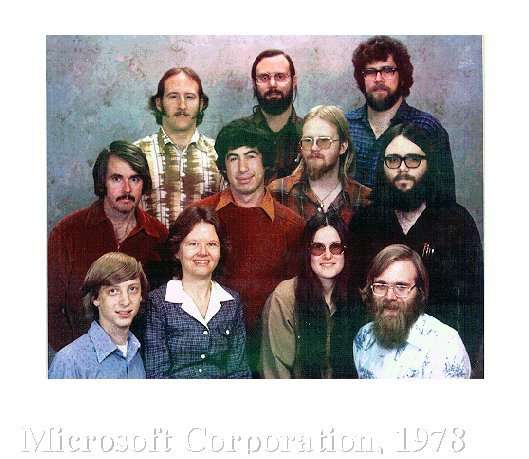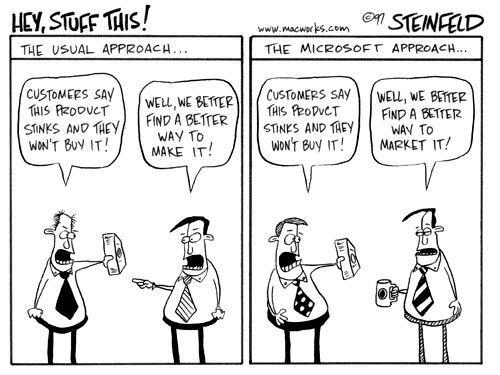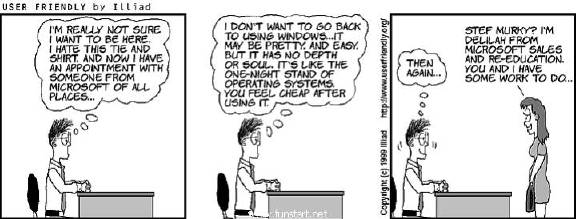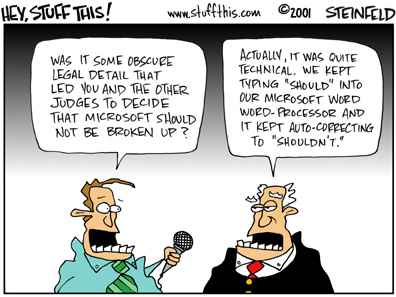
 |
 | |
|
Of course it is impossible to discuss the Mac vs PC matter without bringing up Microsoft. I will briefly share with you my opinion about Microsoft, and then we’ll hear what some others have to say.  As far as business’s having other reasons to exist besides just making profit, this is not some altruistic belief on my part. I have owned a business for many years, and have a strong opinion that a VERY important reason to operate such a business is to provide tangible, genuine, bona-fide benefits to my customers, and society in general. [Ironically, shortly after I originally wrote this, a major article appeared in Money Magazine, about the blended value concept. Worth reading.] In my opinion, the net effect of using Microsoft products is reduced productivity (compared to using alternative software). This is no small matter, as the intended (and advertised) reason to buy any of their products is to increase your productivity. Of course the only way that happens is if the comparison is made to your having no computer at all. The second big negative consequence of using Microsoft applications is that billions of dollars of computer expenditures are wasted. See this, which says “Microsoft is charging monopoly prices for its operating system, resulting in consumer overcharges of tens of billions of dollars, according to an analysis filed with the Joint Economic Committee by the Consumer Federation of America.” Even though this was a few years ago, the situation continues unabated. But just in case you don’t feel that I’m the most objective person on this topic, read what this Stanford University law professor said in April of 2005. Among other things he called Microsoft “a threat to businesses and the economy as a whole.”... And for an insider’s view on this situation, read what a former Microsoft technical manager has to say: “Addiction to Windows revenue, mediocre products, and missed opportunities could doom Seattle’s most successful company.” Interesting stuff.  Again, just one example of this is the absolutely PROFOUND Gistics report (which surveyed over 30,000 business professionals) and concluded “Due to a more efficient computing environment, the Macintosh business user gains, per year, an average of 234 prime time authoring and composing hours than a Windows user... The Mac user generates 7.14 times ROI over three years, while the Windows NT user generates 2.02 ROI... Clearly for profit oriented firms, deployment of Macintosh technology constitutes a fiduciary responsibility.” Read that last sentence again, s-l-o-w-l-y. Oh yes, I know that this report was done a few years ago, but so what? The relative facts are still the same — if not more so. For instance, the Windows comparison was to NT, which was a big seller until recently. Furthermore, Window NT hasn’t changed significantly during this time period, even while the Mac has made enormous improvements. But let’s go back to the time that the Gistics Report first came out. I ask you: why wasn’t this a headline story in the New York Times or Wall Street Journal? I ask you: how many businesses did their fiduciary obligation and changed to the Mac OS? And I ask you: what did Microsoft do to acknowledge and correct the poor productivity of their products? The more I think about it the more I am concerned about millions of individuals and businesses giving up Control of their computing experience. I wrote a few words to this effect in the introduction. I remember awhile back reading a surprisingly serious and technically detailed article entitled something like “Why I Hate Microsoft”. Since I didn’t have a copy I searched for that specific phrase in Google. I was genuinely shocked to see that Google reported over 2000 sites having that exact phrase! I looked at a handful of these and was very impressed by the fact that these were not ravings by some lunatics, but rather were mostly thoughtful analyses by competent people genuinely concerned about our computer welfare. Here is a good example... This is a great article. The author goes into details about a variety of Microsoft related issues, like: “Some of Your Cherished Beliefs About Microsoft are Myths”. [Note: he also has a section titled “How Microsoft Products Harm Your Productivity”, so you can relate that to my prior personal observations.] If you want more, here is a sample collection of anti-Microsoft sites. ------------------ Another intriguing thought is this: if Microsoft programmers are so smart (as some people evidently believe) then (since they START by copying somebody else’s RELEASED software products) why isn’t Microsoft software MUCH better? One observer’s on-point comment is that “their fundamental design flaws are completely hidden by their superficial design flaws.” And if you look up the term “bloatware” in the dictionary, you are likely to see a picture of some Microsoft product.  Starting sometime after 2000, Microsoft decided that the next Big Thing that would impose on our society is what they call “.Net”. Since it has already begun, you should look at this basic definition, or a somewhat more technical discussion about what the situation is, plus read these very candid comments (ComputerWorld). Here is an example of typical .Net problems (ZDNet) plus an article about other concerns. And this November 2003 concern. The best news is that (so far) it looks like Microsoft will not succeed here. If that threat isn’t bad enough, Microsoft’s Palladium (aka NGSBC) comes in as a close second in the area of upcoming concerns. This report says, “This is the most outrageous thing that has so far happened in the computer world... Palladium requires users to place a huge amount of trust (!) in Microsoft. You don’t get to decide what runs on your computer — Microsoft does. You can’t even open files unless you’ve been authorized by Microsoft, or by a third party. And that puts a huge amount of power into the hands of these corporations.” Palladium was short-listed for the Most Invasive Product of the year award (2003). Here is a ZDNet piece, and a more detailed, insightful explanation by Ross Anderson (August 2003). Although three were several reports that this effort at intrusion had failed, more recent information (April 2005) is saying that it will just be resurrected (not surprisingly) in a different manner. And then there is the Internet. In an email I recently received, the author states “As more and more web based business and content creators move to the Microsoft content creation and development tools, fewer third party operating systems and browsers will work with MS branded sites. Microsoft is set to conquer covertly would it could not overtly. Since Microsoft is stopping standalone development of its Internet Explorer browser and is tying it to its next OS ‘Longhorn’, if you want to access content or services created with MS products you will need a Microsoft OS with a Microsoft browser.” And in a similar type of scheme, this 2004 CNET article says ”Microsoft applies for patents that could prevent competing applications from reading documents created with the latest version of Office... XML-based capabilities have been one of the main selling points for the latest versions of Office. By saving documents as XML files, the new Office will allow back-end computing systems such as corporate databases to retrieve and reuse data from documents. XML support also allows Office to become a client for viewing and manipulating data from Web services and complex enterprise applications, such as customer relationship management software.” One of the most disconcerting aspect of the control issue is Microsoft’s dismal record in providing secure software. These experts say Microsoft "Deserves an F" for security. One of Microsoft’s pat defenses for the innumerable weak links that have been exposed in its software, is that if users install the fixes (many) provided by Microsoft, then things will be OK. As this 2003 CNN piece explains, Microsoft itself was recently victimized by a severe attack — and an investigation revealed that Microsoft had not installed its own patches. And hey, whatever you do, don’t tell the Truth. This September 2003 story states "The chief technology officer for a technology firm that works closely with Microsoft lost his job after he helped write a study critical of the insecurity of Microsoft software." And that the "firing was reflective of Microsoft’s far-reaching ability in Washington and across the technology industry to silence experts who complain about weaknesses in its software or its aggressive business practices." This response probably should come as no surprise as Microsoft has a history of spreading FUD (Fear, Uncertainty and Doubt), which usually flies in the face of Truth.
 In November of 2002, the new judge only marginally increased the penalties on Microsoft. This CNET story gives some details. A good assessment said: “This is a miscarriage of justice, and the Bush administration’s DoJ has clearly abrogated its responsibility to the American people. Microsoft has continued the very practices that were found to be in violation of the law, yet the DoJ’s settlement does not address any of those practices. During and after the trial, Microsoft has held that it did nothing illegal, despite the ruling to the contrary being upheld by the appellate court, and the company has since behaved accordingly. Today’s decision gives the company the green light to continue to do so.  Most states threw in the towel saying either that they had better uses of their resources (doubtful considering the implications here), or that we should give Microsoft a chance to become a good citizen (might as well have set up Bonnie and Clyde with an ATM franchise)... Fast forward to January 2004 and the Justice department concludes that Microsoft is still not in compliance (imagine!). at what point will you become concerned enough to do something about this? ------------------ In one of several semi-positive articles on this topic, this September 2002 NewsFactor piece asks “Are the Floodgates Opening on Microsoft?”, and then gives several citations that might be indicators that it is... Contrary to the layperson’s perception, Microsoft has had many product failures. This Seattle Weekly piece lists quite a few and says "some observers say Microsoft’s biggest failures are still in progress." And this November 2003 PBS story has the optimistic theme about Microsoft not being forever (but they will be milking every dollar from you that they can in the meantime). I’ve upped my standards, so up yours.” After reading this section, the clear question that SCREAMS OUT is: “how has this whole Microsoft mess been allowed to happen?” Unfortunately the equally clear answer is:  Four unrelated camps have been the major contributors: 1) millions of technically challenged laypeople have mindlessly bought into the Wintel charade, combined with 2) thousands of self-promoting semi-technically competent business MIS persons who continue this farce, 3) IBM (in the 80’s and 90’s), and 4) two or three judges who are clueless (NOT the courageous and insightful Judge Jackson). * * * * * * * * * * * * * * * * * * * * * * * * * * * * * * * * * * * * * * Download a printable pdf version of this document (rev: 5/02/05). If you have any constructive comments or suggestions about this page, This section’s Haiku rev: August 6, 2007 — Section #11 — |